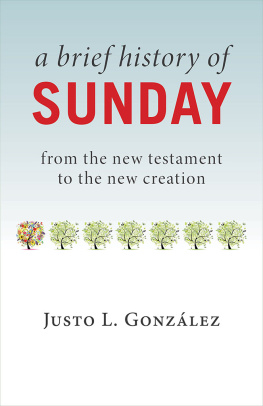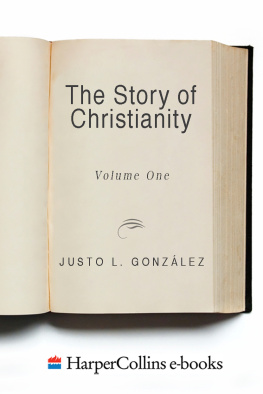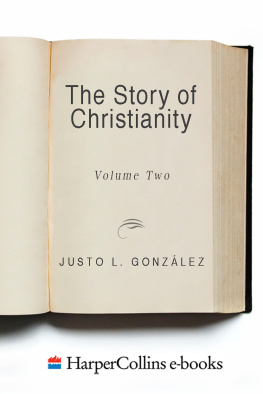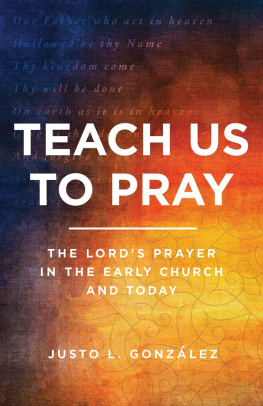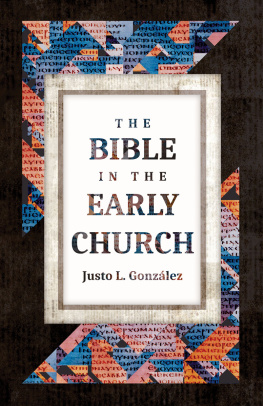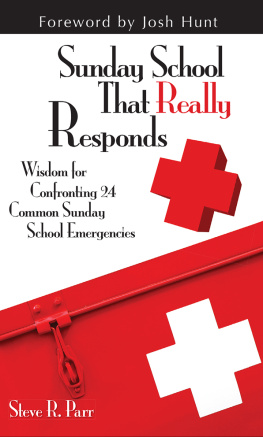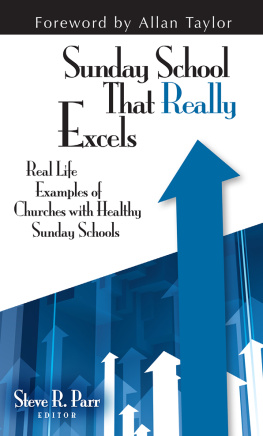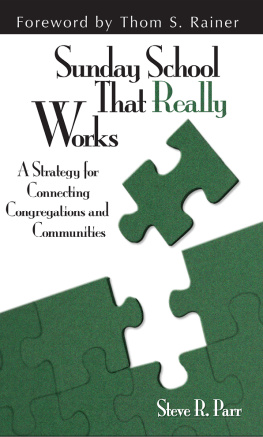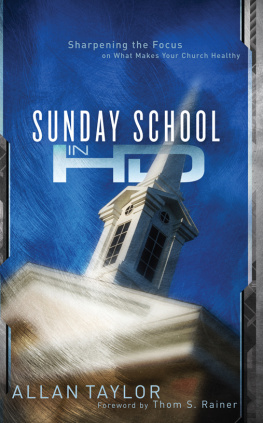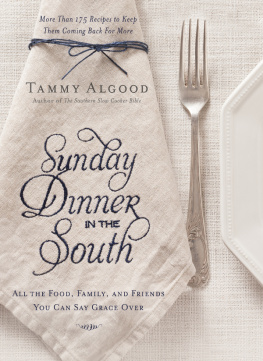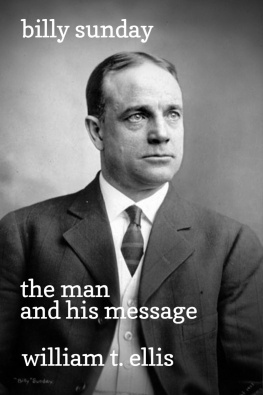A Brief History of Sunday
From the New Testament to the New Creation
JUSTO L. GONZLEZ
WILLIAM B. EERDMANS PUBLISHING COMPANY
GRAND RAPIDS, MICHIGAN
Wm. B. Eerdmans Publishing Co.
2140 Oak Industrial Drive NE, Grand Rapids, Michigan 49505
www.eerdmans.com
2017 Justo L. Gonzlez
All rights reserved
Published 2017
23 22 21 20 19 18 171 2 3 4 5 6 7
ISBN 978-0-8028-7471-9
eISBN 978-1-4674-4693-8
Library of Congress Cataloging-in-Publication Data
Names: Gonzlez, Justo L., author.
Title: A brief history of Sunday : from the New Testament to the new creation / Justo L. Gonzlez.
Description: Grand Rapids : Eerdmans Publishing Co., 2017. |
Includes bibliographical references and index.
Identifiers: LCCN 2017003984 | ISBN 9780802874719 (pbk. : alk. paper)
Subjects: LCSH: SundayHistory.
Classification: LCC BV111.3 .G66 2017 | DDC 263/.309dc23
LC record available at https://lccn.loc.gov/2017003984
Contents
| 1 Apol. | Justin Martyr, First Apology |
| ANF | The Ante-Nicene Fathers. Edited by Alexander Roberts and James Donaldson. 18851887. 10 vols. Repr., Peabody, MA: Hendrickson, 1994 |
| Apol. | Tertullian, Apology |
| ca. | circa |
| Dial. | Justin Martyr, Dialogue with Trypho |
| Etymol. | Isidore of Seville, Etymologies |
| Inst. | John Calvin. Institutes of the Christian Religion. Edited by John T. McNeil. Translated by Ford Lewis Battles. 2 vols. Library of Christian Classics 2021. Philadelphia: Westminster, 1960 |
| LW | Luthers Works. Edited by Jaroslav Pelikan and Helmut T. Lehmann. Saint Louis: Concordia; Philadelphia: Fortress, 195886 |
| NPNF2 | The Nicene and Post-Nicene Fathers, Series 2. Edited by Philip Schaff. 18871894. 14 vols. Repr., Peabody, MA: Hendrickson, 1994 |
| NRSV | New Revised Standard Version |
| PG | Patrologia Graeca [= Patrologiae Cursus Completus: Series Graeca]. Edited by Jacques-Paul Migne. 162 vols. Paris, 18571886 |
| PL | Patrologia Latina [= Patrologiae Cursus Completus: Series Latina]. Edited by Jacques-Paul Migne. 217 vols. Paris, 18441864 |
| Shabb. | Shabbat |
When I first told my friends that I was considering writing a history of Sunday, the most common reactions were what I expected. On the one hand, some of my Seventh-day Adventist friends began sending me books on the Sabbath and pointing me to other materials on the subject. On the other, some of my Methodist and Presbyterian friends encouraged me, saying that it was time for someone to speak up against the increasing secularization of Sunday with its soccer games, beach parties, and so forth.
I am afraid this book may disappoint such expectations; but I also hope it will surpass them. First, this is not a history of the Sabbath. It is not a history of how Christians came to abandon the seventh day. It is a history of Sunday, what Christians have thought about it, and how they have observed it. Therefore it touches on the Sabbath only as whatever was said or done about it touches on what was said or done on Sunday. There are evidences that the seventh day continued to be a day of great significance for many Christians for centuries, and I will refer to them as they touch on the subject of Sunday; but to follow such evidences in any detail falls beyond the scope of this book. Second, many may be surprised to learn that connecting Sunday with the fourth commandment finds very little warrant in the early church, and that calling Sunday the Sabbath is a relatively new phenomenon.
But beyond such disappointments lies a perhaps unexpected gift. It is the gift of rediscovering the joy and the excitement of Sunday as early Christians viewed and celebrated it. It is also the gift of understanding the process whereby that day of joy and celebration became a day of rest, and then a day of severe austeritya severity whose demise some now bemoan, and others celebrate. But above all it is the gift of discovering, in this twenty-first century of increasing indifference or even hostility to Christianity, how some of the visions of Sunday as the church understood that day when it too lived in a hostile environment may be of help and inspiration to us in our day.
But that is enough. Let us begin unwrapping the gift.
Measuring Time
Keeping track of the cycles of time is a basic necessity of human life. Farmers need to know when to till and plant, when rain may be expected or not, and how long their harvest must last until the gathering of the next crop. Shepherds need to know when it is time to shear their sheep. Sailors must plan their voyages on the basis of the wind and weather to be expected at a particular time of the year. Hunters need to know when the moon will be full. Those who live by fishing need to know both the phases of the moon and the rhythm of the tides. And religious ceremonies must take place at appropriate times, relating to cycles of harvest and weather.
What immediately emerges as one thinks of these various examples is that the cyclical dimension of time is paramount. There certainly is a lineal dimension of time, for what is past will never return, and in an absolute sense every future will be unprecedented. What is of paramount importance for people in their daily life is not what happened a thousand years ago, or what will happen next century, but what tomorrow, next week, or next month will be likethat the sun will shine, that it will be cold, that it will not rain.
Such knowledge, based on the observations of generations and generations, is cyclical by its very nature. At the most basic level, there is the cycle of dawn, noon, dusk, night, and a new dawn. At another level there is the cycle of the seasons, governed by the sunusually directly, but sometimes indirectly, as with the flooding of the Nile or with the monsoons.
The Days of the Week
But these two cycles, the day and the year, do not suffice for the ordering of social and economic life. One is too brief, and the other too long. Hence the necessity for the intermediate cycles we usually call weeks and months. From the three-day week of the Basques, passing through the ten-day week of the ancient Chinese and Egyptians, and to the thirteen-day week of the Aztecs, every civilization needs a way of counting days so as to organize its economic, social, and religious life. As part of its Cult of Reason, the French Revolution proposed a supposedly more rational calendar, with ten-day weeks; but it soon became clear that the tradition of a seven-day week was too deeply ingrained in the popular mentalityparticularly since the heavenly bodies would not cooperate by subjecting the rhythm of their movements to what the French considered reasonable!
The seven-day week as we now know it seems to have originated among the ancient Semitic and Mesopotamian peoples. It certainly played a central role in Jewish lifea subject to which we will return. But it was also characteristic of other cultures and civilizations in Mesopotamia itself as well as west of it. Most scholars see a connection between the lunar cycle, which is roughly twenty-eight days, and the seven-day week, which would then correspond to each of the four phases of the moon.
We do know that at least by the sixth century BCE the Babylonian calendar was organized around a lunar cycle of twenty-eight days, beginning with the new moon, and divided into four weeks by a sequence of special days: the seventh, fourteenth, twenty-first, and twenty-eighth. These special days were considered ill-suited for business, and sacred in such a way that they were sometimes deemed evil or inauspicious. But the moon would not cooperate, for its cycle is not really twenty-eight days, but a bit more. This had to be corrected by extending the final week of some months to eight or even nine days. The days of the typical seven-day week referred to the seven closest celestial bodies: the sun, the moon, and the five planets visible to the naked eye.

